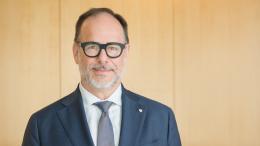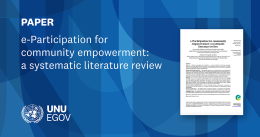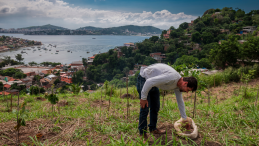In a thought-provoking conversation at the United Nations University with Rohinton Medhora, the President of the Centre for International Governance Innovation (CIGI), I asked the question, “What Are Think Tanks Good For?” His answer was to the point, “influence peddling, in the best sense of the term.” He went on to stress that while one could question the tactics and motivations behind how and who think tanks influence, the bottom line was that they are in the business of pushing for change through ideas and networks. The litmus test of a good think tank, according to Medhora, was not whether it was “right, left, liberal or not, but whether it was proposing evidence-based discussion.”
Medhora’s view is widely held. The dominant understanding is that think tanks exist to mobilize expertise and ideas to influence the policymaking process. The raison d'être for most think tanks is to serve as important catalysts for ideas and action. In a world facing many pressing problems that include extreme poverty, inequality, climate change, rapid urbanization, the spread of infectious disease, armed conflict, international terrorism, organized crime, and the proliferation of nuclear weapons, good ideas that can be acted upon are essential. At their best, think tanks possess the ability to capture the political imagination by brokering ideas, stimulating public debate, and offering creative yet practical solutions to tackle the world’s most pressing problems.
Think tanks have made these kinds of contributions in the past. For example, Leo Pasvolsky, a Brookings Institution expert, was instrumental in helping to rebuild Europe after World War II by putting forward concrete recommendations that helped shape the Marshall Plan. The Carnegie Endowment for International Peace, led by its then president Raphael Lemkin, played a pivotal role in promoting the passage of the UN anti-Genocide Convention by the General Assembly of the United Nations in 1948, spurred on by the need to prevent another Holocaust. In the midst of the 2008 financial crisis, CIGI’s proposals for innovation in the G8 system helped lead to the creation of the G20 leaders' group.
This development helped to establish the G20 as the premier forum for international economic cooperation in troubled economic times. Another example of a breakthrough spearheaded by a think tank was the idea of Advanced Market Commitments for Vaccines championed by a Center for Global Development Working Group. The result was a mechanism that provided guarantees to increase private investment in R&D for vaccine development for diseases that primarily affected developing countries. In 2005, the G-7 Finance Ministers endorsed this idea and six donors committed USD 1.5 billion to the initiative. These ideas were often not developed in isolation but were part of an iterative process of discovery, learning, and adaptation - sometimes through failure. In each case, timing proved to be critical.
Serving as a catalyst for ideas is only one aspect of the role that the best think tanks play. Another essential role is in helping to set the policy agenda. Yet, getting on the policy agenda is a complicated task. Even the best think tanks miss key opportunities to translate a persuasive idea into reality. John Kingdon’s work on this subject is instructive because it underscores the inherent unpredictability of the policy process. According to Kingdon, getting an idea on the governmental agenda requires persistence, expertise, cultivating the right connections, and above all, good timing. As he put it in his book Agendas, Alternatives, and Public Policies, “being heard in the policy process is often more a matter of being positioned to take advantage of opportunities when they arise, than it is doing a set of things fully under one’s control.”
Successful think tanks keep their proposals at the ready and when a problem emerges to which their proposals can be the solution, they jump into action. Having good ideas is not enough. As Kingdon stressed, “ideas do not drive policy changes by themselves, they must be coupled with more conventional political forces.” To be successful, think tanks need to have sufficient resources and persistence to continuously cultivate an idea as they wait for the right moment to mobilize an alliance of supporters around it.
There is a flip-side to the inherent unpredictability of the policy process, which is that good ideas do not always win out. Unfortunately, there have been instances when ideologically driven think tanks supported misguided ideas that shaped how governments understood the world, assessed their options, and acted to great detriment. We saw this in the run-up to the 2003 Iraq War when the terrorist attacks of 9/11 gave proponents of regime change in Iraq (among them the Project for the New American Century - PNAC) the cover to invade Iraq and remove Saddam Hussein in the name of spreading democracy and winning the war on terror. PNAC and other proponents of regime change were so effective at shaping the policy preferences of George W. Bush and his administration that persuasive evidence to the contrary was ignored and discounted, leading to a costly war.
As former Canadian Senator Hugh Segal has suggested, think tanks are at their worst when they are narrowly ideological and consistently generate predictable findings on any question despite evidence to the contrary. Think tanks that demonstrate such behavior should be discounted. However, as the seminal study by Robert Jervis on Perception and Misperception in International Politics demonstrated, experts and policymakers can be susceptible to actively avoiding and ignoring information that contradicts their beliefs. More recently, the 2015 World Development Report on Mind, Society and Behavior from the World Bank explained how policymakers and even experts can be prone to “thinking automatically.” As the WDR 2015 underscored, discussions among people who share similar views can lead them to become more extreme in their positions. In fact, the report clearly demonstrated how a failure to confront the concerns of individuals with differing views can lead to “consistently biased decision making.” Research has shown that it is critical for policymakers to become aware of their own biases in order to avoid selecting and filtering evidence in a way that confirms their views.
One of the best ways to avoid confirmation bias, according to the WDR 2015, is to expose people to opposing views and invite them to defend their own. The best think tanks do just that. They create social and intellectual settings that force people to argue and become aware of their own biases. They provide a platform to introduce new ideas and provoke public debate on the critical issues of the day and in so doing expand the scope of the debate.
In developing country contexts with relatively recent democratic traditions, think tanks are increasingly taking on this function. For example, the Institute of Economic Affairs in Ghana played a pivotal role in helping to strengthen democracy in a context of political instability by organizing workshops, voter education forums, and presidential and vice-presidential debates. The Think Tank Initiative (funded by Canada’s International Development Research Centre, the Bill and Melinda Gates Foundation, the William and Flora Hewlett Foundation, UK Aid, the Ministry of Foreign Affairs of the Netherlands, and the Norwegian Agency for Development Cooperation), is just one example of a program that is helping to strengthen the role of think tanks in the Global South to provoke public debate on important public policy issues of the day.
2015 will be a pivotal year for the world. With a large number of very important policy processes underway, the UN Secretary-General has declared that “2015 can and must be a time for global action”. These policy processes will culminate with important decisions that will shape the course of action on issues ranging from international peace and security, to climate change, and global development and think tanks need to play a constructive role.
In terms of international peace and security, the United Nations is currently undertaking two important independent reviews. The first is on peace operations, where the Secretary-General has appointed a High-Level Independent Panel on Peace Operations to assess how UN-led peace operations need to change in order to remain effective in a world confronting increasingly complex and volatile security environments. Another important policy process that will have an impact on war-torn societies is the expert review panel on the UN’s Peacebuilding Architecture.
Negotiations leading up to the Special Summit on Sustainable Development (15-28 September), also represent a critical policy process. At this Summit, UN Member States will debate and ultimately approve the Sustainable Development Goals that will set the global development agenda for the next fifteen years. The challenge, as UNU Rector David M. Malone put it in a recent article, is to craft a sharp and compelling post-2015 framework that could stand the test of time and relevancy over a 15-year period. The complex negotiation process involving many diverging national interests, however, will make this outcome difficult to achieve. Yet, as I stressed in a recent article, it is imperative that the world sets realistic goals that build on the success to date and commit to promoting human dignity, equality, and equity.
Finally, another critical period will be between 30 November and 11 December when Paris will play host to the 21st Conference of Parties to the UN Framework Convention for Climate Change. At this conference, 190 parties will try to arrive at an agreement on greenhouse gas emission targets to replace the Kyoto Protocol.
To put it bluntly, policymakers are struggling to develop effective responses to many of the key issues that will be debated in these policy processes and think tanks can play a constructive role by bringing practical and feasible options that tackle these issues to the negotiating table. think tanks, including the United Nations University Centre for Policy Research, are already playing an important role in contributing evidence-based assessments (see for instance UNU-CPR’s paper for the High-Level Independent Panel on Peace Operations). Yet, more ideas are needed so that these processes generate effective recommendations and solutions.
This, ultimately, brings me back to my conversation with Rohinton Medhora. To succeed, think tanks need at least four elements. They need good ideas, a coalition of actors to support those ideas, the institutional capacity (including resources) to nurture and shepherd those ideas in a dynamic context, and the ability to seize the moment when the timing is right. What they need is the means to champion good ideas when the world needs them most. In other words, think tanks need to do what they are good at, influence peddling in the best sense of the term.
Suggested citation: Dr John de Boer., "What Are Think Tanks Good For?," UNU-CPR (blog), 2015-03-17, https://unu.edu/cpr/blog-post/what-are-think-tanks-good.





